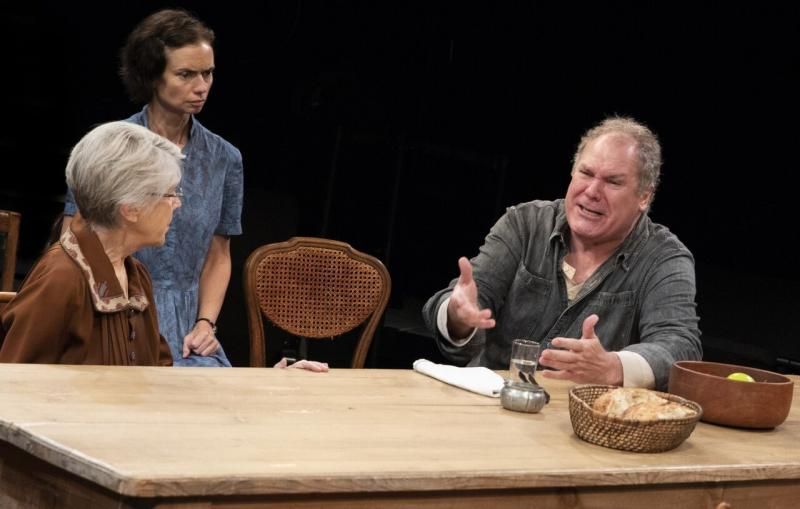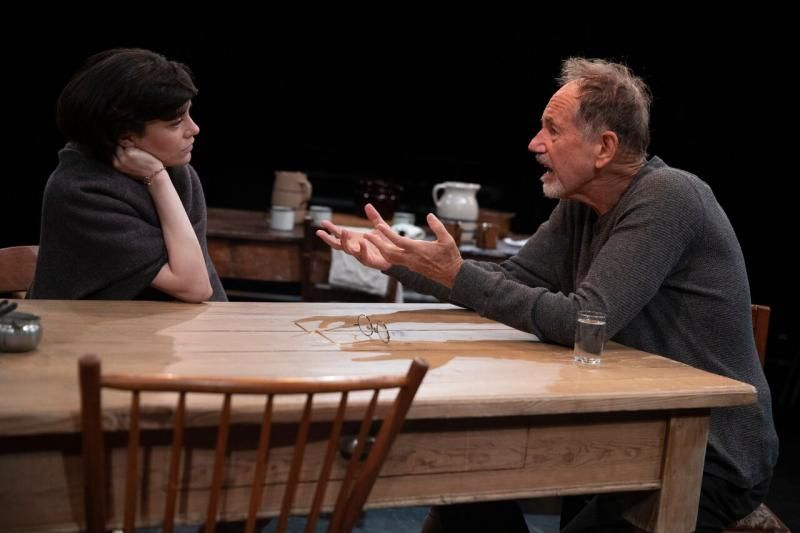Review: Richard Nelson Gives UNCLE VANYA The Rhinebeck Treatment
For the better part of the present decade, playwright/director Richard Nelson has been going seriously Chekhovian, first with a quartet of plays set during the Obama years in the Rhinebeck, New York home of a family named Apple and then with a trio of visits during the 2016 presidential campaign with the nearby Gabriel family.

(Photo: Joan Marcus)
With each piece premiering at The Public Theater and recurring roles, for the most part, played by the same ensemble of actors for each series, the Apples and the Gabriels invited comparisons to the characters inhabiting works such as THE CHERRY ORCHARD and THE SEAGULL with their indirect way of communicating about social issues through more personal conversation.
The style of each play and their intimate premiere productions were identical, with audiences surrounding a playing area that was usually one communal room (a kitchen, a dining room), intermissionless action centered on the preparation or consumption of a meal and quiet tones that had actors achieving great naturalism in their performances through texts of plainspoken eloquence.
So when the author uses the same style to co-translate (with Richard Pevear and Larissa Volokhonsky) and direct Anton Chekhov's masterwork UNCLE VANYA, as the premiere entry for the Hunter Theater Project, it's fair to say he goes a bit Nelsonian on the piece.
The lengthy text has been pared down to under two hours with no intermission. Two characters, the destitute Telegin and the walk-on role of a workman, have been axed. The most interesting feature of the translation is how the language rarely commits itself to a period. While the occasional expression may land a bit modern on the ear, the adaptation tends to lie somewhere between contemporary jargon and the English language from a time closer to the play's 1899 premiere.
The same might be said of designer Jason Ardizzone-West's kitchen set, which, aside from the lack of running water and modern appliances, never stresses the play's original period. The costumes by Susan Hilferty and Mark Koss also could be appropriate for any era during the last 119 years.
New York stage gem Jay O. Sanders is extremely compelling in the title role, a middle-aged man who has spent his entire adult life taking on the responsibility of managing the family estate, sacrificing his opportunities to excel in life. His Vanya is a streetwise philosopher with a poetic streak that masks unbearable frustration that finally explodes out of him during the play's climactic moments. A regular guy who's charming on the outside but crumbling on the inside.

(Photo: Joan Marcus)
The excellent Jon DeVries is coldly dignified as Vanya's brother-in-law, Alexander Serebryakov, who acquired the estate through his marriage to Vanya's deceased sister. Serebryakov is now married to decades-younger Elena (Celeste Arias) and lives handsomely off the land's profits while Vanya diligently scrimps to keep a roof over the head of his underappreciative mother, Marya (Alice Cannon).
In between intellectual discourse, Vanya and local doctor Astrov (Jesse Pennington), both lust for Elena, who is accompanying her husband on a visit to the estate. While keeping an upbeat attitude, Arias nicely communicates the melancholy Elena feels as a woman valued only for her beauty.
But it's Yvonne Woods' captivating performance as Sonya, Serebryakov's daughter through his first marriage, that gives this production its true beauty. Sonya lives with her Uncle Vanya and her grandmother, assisting in the running of the estate, presumably until she finds someone to marry her. But being regarded as plain-looking, her prospects are limited.
To paraphrase a popular expression, anyone would wish for someone who looks at them the way Woods' Sonya looks at Pennington's Astrov. She gives off a glow of happiness just for being in the state of being in love and when faced with the fact that he will never return her affection, it's heartbreaking to see her bravely accept the truth and go on, looking for the positives in her mundane life.
The role of Vanya's mother is significantly smaller in this edited version, but Cannon does fine work showing how the character just wants to avoid conflict. Kate Kearny-Patch also does well as the estate's cook, frustrated by the inconsistent mealtime schedule brought about by the visitors.
With audience members on four sides of the playing space and most of the drama performed with soft-spoken naturalism, sound designer Will Pickens deserves praise for his realistic, but perfectly audible, work.
Anyone who has been keeping up with the Apples and the Gabriels for the past eight years may find the proceedings a bit familiar, but as long as Nelson's productions keep supplying such superb ensembles giving such fully-realized performances, familiarity breeds admiration.
Reader Reviews
Videos

